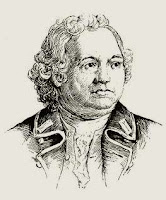A Solid Source for the “Whites of Their Eyes” Tradition
 “Don’t fire till you see the whites of their eyes” is the most famous quotation arising from the Battle of Bunker Hill. Authors have debated which American officer said it, which has been another way of debating who was in command. In recent decades most historians have treated those words as a legend, or at least a tradition that can’t be verified.
“Don’t fire till you see the whites of their eyes” is the most famous quotation arising from the Battle of Bunker Hill. Authors have debated which American officer said it, which has been another way of debating who was in command. In recent decades most historians have treated those words as a legend, or at least a tradition that can’t be verified.
That tradition doesn’t benefit from the fact that for a long time the earliest chronicle known to quote the line was the biography of George Washington by Mason Weems, whose tales of cherry trees and praying in the snow at Valley Forge have become exemplars of American mythology.
This month I got lucky in some digital databases and found an earlier source for the “whites of their eyes” tradition, with a clear chain of transmission from the battlefield.
The story starts with David Humphreys’s publication of An Essay on the Life of the Honourable Major-General Israel Putnam in 1788. That book’s description of Bunker Hill does not include the quotation. It also suggested that Dr. Joseph Warren was directing the New England forces in his new capacity as a Massachusetts major general.
The Rev. Josiah Whitney (1731-1824), minister in Brooklyn, Connecticut, followed that up with his most famous parishioner, Israel Putnam. The retired general said that Warren had come onto the battlefield as a volunteer, not a commissioned officer, and didn’t presume to take command. Putnam died in 1790, and Whitney described their conversation in a footnote to his sermon A Sermon Occasioned by the Death of the Honorable Major-General Israel Putnam, of Brooklyn.
Ten years later, the Rev. Elijah Parish (1762-1825) of Byfield, Massachusetts, published An Oration, Delivered at Byfield, February 22d, 1800, the Day of National Mourning for the Death of General George Washington. On page 15 he added his own footnote describing the Battle of Bunker Hill. Parish, who originally came from Lebanon, Connecticut, said he’d discussed that battle with his older colleague Whitney.
Parish wrote:
Putnam was the commanding officer of the party, who went upon the hill the evening before the action: he commanded in the action: : he harangued his men as the British first advanced, charged them to reserve their fire, till they were near, ‘till they could see the white of their eyes,’ were his words.—At the second assault he commended their former calmness, assured them “they would now do much better,” and directed them “to aim at the officers.” They obeyed. The fire was tremendous. ‘My God,’ said said Putnam, in telling the story, ‘I never saw such a carnage of the human race.’Parish repeated this story in a history textbook he cowrote with the Rev. Dr. Jedidiah Morse, A Compendious History of New England (1804).
These things he related to the Reverend Mr. Whitney, his Minister, by whose permission they are now published.
Thus, we have a clear line of transmission for the quotation:
- Gen. Israel Putnam reminiscing to Rev. Josiah Whitney, probably between 1788 and 1790.
- Whitney passing on an interesting anecdote to Rev. Elijah Parish between 1790 and 1800.
- Parish publishing the story twice in the early 1800s, enough to bring it to the attention of the Rev. Mason Weems by 1810.
TOMORROW: When Howe said “not to fire before he could see the whites of their eyes.”
